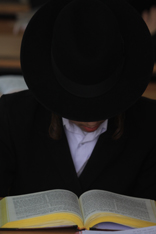In I got It!
HaShem’s Army
Torah learning is a profession not to be disturbed.
From the time of the end of the British mandate in Eretz Yisroel and the founding of the independent state of Israel, great efforts were already being made to prevent compulsory drafting of yeshiva bochurim, whose only ‘profession’ was learning Torah.
In the year 5707 (1947ce), David Ben Gurion, the first prime minister of the new state, established the principle of ‘Torah as a profession’ as part of the status quo understandings made between the government and the orthodox community. (As for the matter of female conscription, it went to the very heart of Yiddishkeit. and the matter was referred to Agudas Yisroel to try to find a compromise solution for the opposing sides.)
The essence of ben Gurion’s statute was an exemption for yeshiva students (and later also kollel students) from compulsory national service, as long as they complied with two stipulations: All of their time had to be dedicated to Torah study, and they were not to engage in paid work of any kind during their regular study hours.
The origin of the phrase used to describe this situation, literally ‘his Torah is his profession’, is to be found in the Babylonian Talmud, maseches Shabbos daf 11. There it is written:
“It is taught; scholars who are in the middle of learning should interrupt their studies to recite Krias Shema at the proper time, but not to daven. Rabbi Yochanan says; this is only in reference to those like Rabbi Shimon bar Yochai and his companions, whose Torah is their profession. But those who are like us should indeed interrupt their studies to recite Krias Shema and also to daven at the proper time.”
Thus, the phrase refers to one whose main occupation is learning – he does not engage in any other form of work.
The Supreme Court later invalidated the basis of this understanding, which led, on 22nd August 1999, to the Defense Minister, Ehud Barak, establishing the ‘Tal Commission’, so called after the man chose to head it, judge Tzvi Tal. The commission also numbered among its members representatives of the religious community. It was charged with the provision of a legal basis for the existing situation. The commission’s findings led to the Knesset’s passing of the “Tal law” in 2002, a development that was greeted with mixed feelings in the chareidi community.
The new law succeeded in grounding the situation as it had been until then in law, and the approximately 50,000 yeshiva students who had previously been exempted from service were now formally permitted to continue their studies undisturbed. Another section of the statute allowed a full-time yeshiva student, upon reaching the age of 22, to leave the yeshiva for a ‘year of decision’, during which he could work or learn a profession before being conscripted, if he would continue in that path. On the other hand, if, at the end of that year, he chose to continue his Torah studies, he could do so, but only after serving an abbreviated term of army service, the length of which would depend on his family situation, or alternatively, national service in the community.
The main worry of the chareidi community was that this possibility that had been created with the Tal law of leaving the yeshiva for a year’s deliberation, would allow students to too easily leave the yeshiva and join the workforce, without the threat of conscription hanging over their heads, the threat that until then had kept them as full-time students. In practice, however, only 1520 students took advantage of the ‘opt-out year’, of which only 353 were eventually conscripted.







